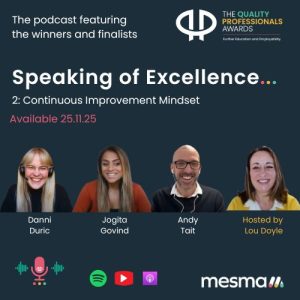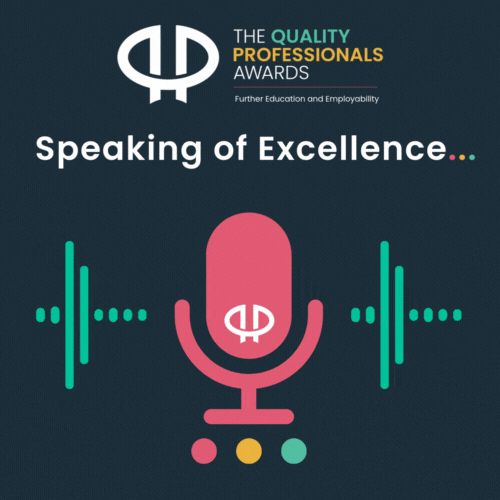Speaking of Excellence – The Podcast of the Quality Professionals Awards
In 2024, Mesma founded The Quality Professionals Awards for Further Education and Employability.
The awards aim to spotlight the sector’s often unsung heroes, the people who work tirelessly behind the scenes to ensure that quality and compliance deliver results for learners and job seekers.
Our ambition is that the awards should leave a legacy of quality improvement across the sector. By sharing the stories of the winners and finalists, we hope that others will be inspired to be bolder and more ambitious and have a bigger impact across the sectors.
We hope you enjoy the series of podcasts and resources – you can access these below.
Please also visit The Quality Professionals Awards website for further information on how to enter the 2025 awards and sign up for updates.
Huge thanks must go to all the sponsors and supporters of the awards, including our headline partners – The Institute of Employability Professionals and Occupational Awards Limited.
Podcast Episodes
Here are the links to the podcast episodes…

Lou Doyle is joined by Melissa Gardiner (then Associate Director of Quality and Performance, Middlesbrough College), Emma Simpson (Teaching and Learning Mentor, Apprenticeships at Middlesbrough College) and Tracey Bedford (Head of Quality at WS Training Ltd.)
One of the most significant shifts since the apprenticeship reforms took hold has been the move from programmes dominated by assessing existing skills to those that set out to develop new knowledge, skills, and behaviours. Many providers and trainers are still on this journey.
What have our guests learned about the transition within their own organisations that might help inform changes for others in the FE and skills sector?

They explore the importance of cultivating a continuous improvement mindset and discuss strategies for fostering a culture of innovation, overcoming resistance to change, and effectively measuring success.
By sharing examples and practical tips, they highlight how involving staff, students, and customers can drive meaningful progress.
Join us as we cross-check ideas on the way continuous improvement can thrive in FE and Employability.
With rare exception, all providers will find themselves in a situation where some or all of their provision is struggling to meet the standards set. It takes strong leadership to take colleagues on a journey of improvement.
What have our guests learned about transforming the quality of education within their own organisations that might help inform the leadership practice of others?
Lou’s guests are Ranjit Singh (Hull College), Sarah Burrows (PMA Education), Lee Lister (Education Partnership North East).
In this episode, Lou is joined by Dr Mandy Crawford-Lee (UVAC), Prof. Darryll Bravenbour (Middlesex University), and Clare Dunn (The Open University). They set out to explore the role HEIs play in widening access to education and careers since the apprenticeship reforms in England. They ended up having two insightful discussions.
Firstly, they discussed how the growth in apprenticeships in Universities and HEIs over recent years has had a ‘disruptive’ influence on both apprenticeships and HEIs. We felt this discussion deserved its own episode.
Look out for the next episode, in which they discuss the collaborative project that won them special recognition with a highly commended award at The Quality Professionals Awards 2024.
In Part 1, Lou Doyle explored how apprenticeships and universities have joined forces in what our guests call a “mutually disruptive but positive” way.
In this episode, we’re diving deeper into the award-winning project itself. Join Professor Daryll Bravenbour (Middlesex University), Dr. Mandy Crawford-Lee (UVAC), and Clare Dunn (Open University) as they discuss:
✅ How the project came to life
✅ Its impact on career progression in healthcare
✅ The broader benefits it’s delivering
✅ Why it matters—and what the future holds for higher-level apprenticeships.
Exploring the Top 10 Insights from the Quality Professionals Awards Finalists and Winners
Introduction
Following the success of the Quality Professionals Awards 2024, we set out with a clear intention: to share the stories of this year’s exceptional finalists and winners. By highlighting their achievements, we aim to leave a lasting legacy for the awards—one that showcases good practice and inspires others to raise the bar for quality across the further education and employability sectors.
To distil the key learnings, we’ve summarised the top 10 themes that emerged from these conversations. Each theme reflects a critical focus area for achieving meaningful change, supported by illustrative clips from our inspiring speakers. From fostering collaboration and empowering staff to embedding professional development, these insights are designed to help you reflect on and implement proven approaches within your own organisation.
- Tailoring Quality Improvement to Organisational Context
Speakers broadly agreed that quality improvement initiatives should reflect the specific culture, needs, and readiness of an organisation. Lee Lister shared, “Understanding the timing, the balance, and the perspective of where you’re working is key to implementing any quality change.” Sarah Burrows explained, “It’s about identifying those who are ready to embrace change and ensuring they feel empowered to drive it forward.”
- Building Trust as the Foundation of Change
Trust emerged as a consistent theme across discussions, regarded as essential to driving successful organisational change. Ranjit Singh described, “We brought in very stringent measures, but it was all developmental—lots of challenge but without the threat of anyone losing their job.” Mandy Crawfford Lee reflected, “The involvement of universities in apprenticeships has created a very aspirational programme that’s based on trust and collaboration.”
- Incremental Improvement Through 1% Gains
Incremental improvement was a recurring theme, with speakers highlighting its effectiveness in sustaining momentum and managing change. Lou Doyle explained, “Sometimes it feels like a mountain to climb, but the question to ask is: what would 1% more look like?” Melissa Gardiner echoed, “By focusing on small, practical steps, we’ve built confidence in our team and made steady progress.”
- The Power of Cross-Sector Collaboration
Collaboration between sectors was widely regarded as a catalyst for innovation and inclusivity. Mandy Crawfford Lee noted, “Collaboration between universities and employers has transformed higher apprenticeships by bringing together the worlds of work and education.” Clare Dunn added, “Partnerships are crucial for ensuring training frameworks are not just inclusive but also impactful.”
- Developing a Culture of High Challenge, Low Threat
Speakers emphasised the importance of balancing high expectations with psychological safety. Sarah Burrows shared, “Creating a culture of high expectations means offering both challenge and support so that teams feel encouraged rather than overwhelmed.” Tracey Bedford added, “Constructive feedback helps create a safe space for growth and innovation without fear of blame.”
- Whole-Organisation Quality Improvement
There was strong agreement on the need for quality improvement to extend across all departments in an organisation. Lou Doyle stated, “Quality improvement works best when it’s a whole-organisation activity, with everyone pulling in the same direction.” Andy Tait highlighted, “You need a consistent framework, but it’s just as important to allow local teams the flexibility to innovate and adapt.”
- Empowering Staff to Drive Quality Improvements
Speakers widely acknowledged the critical role of empowering staff to take ownership of quality initiatives. Jogita Govind reflected, “When you involve staff at every level, you build a growth mindset that drives both individual and organisational improvement.” Emma Simpson shared, “Collaborative CPD frameworks encourage teams to take ownership, which is key to achieving sustainable improvements.”
- Listening to Staff and Building Inclusion
The importance of listening to staff was a recurring theme, with speakers sharing how it drives inclusion and positive change. Lee Lister remarked, “Listening to staff transformed SEN provision at our organisation—we moved from 10 students in a porta-cabin to 80 fully integrated into campus life.” Dani Duric added, “Staff feedback helps us refine our processes and ensures quality outcomes for learners.”
- The Journey to Outstanding
Achieving excellence requires clear leadership and shared ownership across teams. Emma Simpson reflected, “CPD played a key role in our journey towards outstanding; it brought everyone together under a shared goal.” Ranjit Singh explained, “To achieve excellence, you have to empower staff to innovate. Compliance alone won’t get you there.”
- The Role of Professional Development in Driving Change
Speakers offered different perspectives on how CPD drives change, but all agreed on its importance. Tracey Bedford shared, “Structured and accessible CPD empowers staff and ensures alignment with organisational goals.” Jogita Govind added, “CPD is essential for fostering growth mindsets and improving learner outcomes—it’s the foundation for lasting improvement.”
Conclusion
These discussions demonstrate the transformative power of quality improvement and the outstanding contributions being made across the sector. Now it’s your chance to spotlight the individuals, teams, and organisations driving excellence in your own networks.
Nominations for the 2025 Quality Professionals Awards are now open! Submit your entries by 21st March 2025 to celebrate those who are shaping the future of quality in further education, employability, and training.
Visit qualityprofessionalsawards.org to learn more about the categories, criteria, and how to get involved. Let’s continue to champion innovation and collaboration in our sector!
This episode delves into the complexities of managing multiple partnerships while maintaining high standards of quality.
We discuss effective strategies, potential challenges, and success stories to inspire and inform listeners.
Our guest host is Alex Miles, Managing Director of Yorkshire Learning Providers. Alex is joined by Lois Calvert, Multiply York and North Yorkshire and Hayley Lord, South Tyneside Council.
Despite having very different roles within the sector, Hayley and Lois have a lot in common when it comes to ensuring that quality is at the heart of a partnership delivery model. They share fascinating insights into:
- Developing a positive and constructive relationship with a large subcontractor network
- Managing quality standards across different types of accredited and non-accredited programmes
- Supporting people who aren’t used to formal learning and making an impact where is most needed
- Insights into being a local authority learning provider
- How quality professionals are finding their voice and coming together to share great practice across the skills sector
During the session Hayley refers to how she shares Alphabet Squares in her CPD sessions. They are a creative and engaging way to plan key themes within a specific subject area, ensuring that learning remains relevant and meaningful. Each letter of the alphabet is linked to an industry-related topic, incorporating essential embedded elements such as Maths, English, ICT, Safeguarding, and more.
Hayley has kindly shared examples of English and maths Alphabet Squares with listeners for you to download and use.

In this episode, two successful, multi-awarding winning, providers are leading the way in transforming women’s employment outcomes through innovative approaches and practical support.
Liz Sewell and Kaneez Fatima from Belina GROW and Jane Knight from Successful Mums Academy are our guests. Dr Barbara Van Der Eecken guest hosts the episode.
We will hear their strategies for creating high-quality employability and training provision designed to engage and support women into meaningful work.
This episode explores how to foster a culture of compliance within organisations.
We will delve into why compliance is crucial for sustainable success, how it can be integrated seamlessly into daily operations, and the benefits of a robust compliance model for employees, stakeholders, and the organisation as a whole.
Hosted by Lou Doyle, our guests are:
Heather Collins – London South Bank University
Jo McCormack – Education Partnership North East
Paul Rogers – WS Training
Alisha Burke – NCFE


